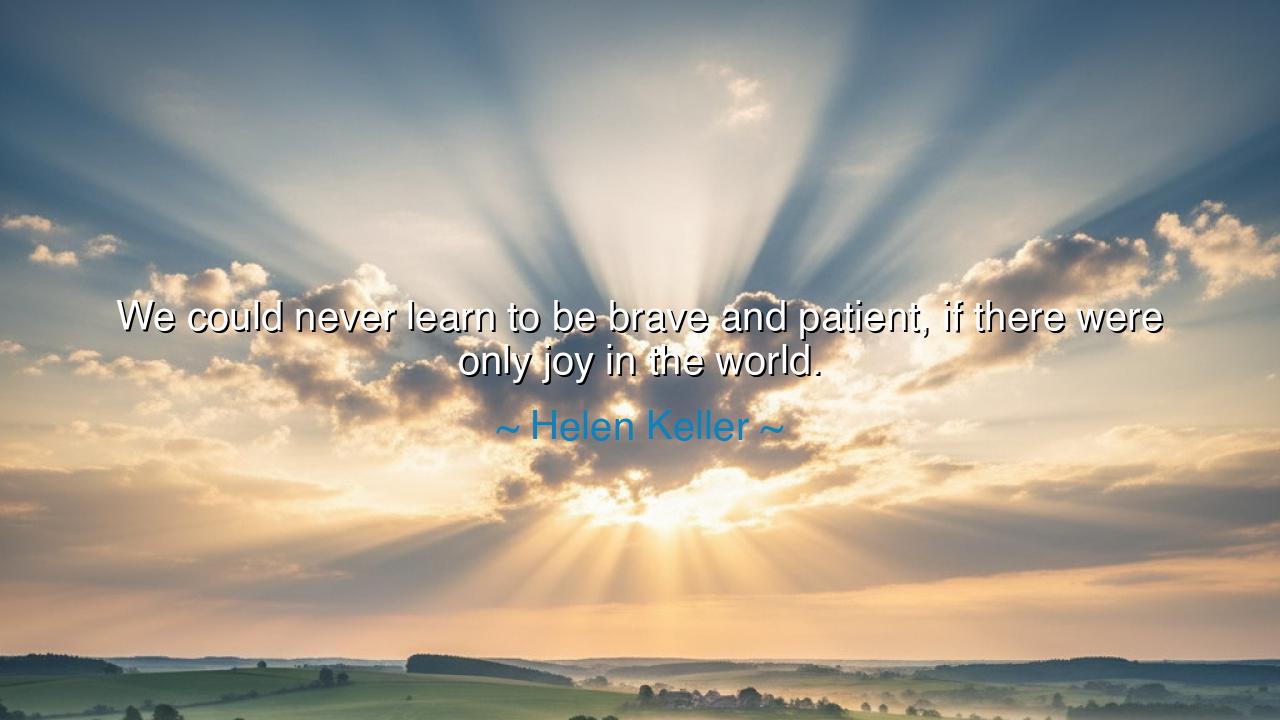
We could never learn to be brave and patient, if there were only






Hear the radiant yet sorrow-tempered words of Helen Keller, who dwelt in darkness and silence yet spoke with a voice brighter than many who saw and heard: “We could never learn to be brave and patient, if there were only joy in the world.” This truth, uttered by one who knew suffering as a lifelong companion, resounds like a bell across the ages. For she reminds us that it is not ease, but trial, not comfort, but hardship, that forges the eternal virtues of the soul. Joy delights, but it does not discipline. Bravery and patience are born only in the crucible of sorrow.
The origin of this wisdom lies in Keller’s own life. Stricken as a child by an illness that left her both blind and deaf, she was cast into a prison of isolation and rage. Yet with the guidance of her teacher, Anne Sullivan, she broke through the walls of silence and found the gift of language. It was not an easy path, but a path paved with frustration, tears, and endless labor. From these struggles, she learned that her true strength was not found in joy, but in endurance. Thus, she could speak with authority: patience is not given—it is learned through trial. Bravery is not innate—it is born in the presence of fear.
The ancients too bore witness to this law of the soul. Think of Hercules, whose labors were not feasts of pleasure but trials against beasts and burdens. Through those trials, his courage was revealed. Or recall Job, who sat in ashes, stripped of all, yet through his suffering learned the depth of patience and the endurance of faith. Without hardship, their names would not echo through history. So Keller stands in their company, reminding us that adversity is the anvil upon which greatness is hammered into form.
Consider also the story of Abraham Lincoln. His life was scarred by poverty, personal loss, and repeated failure before he rose to lead a divided nation. In his letters and speeches, he often revealed the weight of sorrow, yet it was this very sorrow that gave him the patience to navigate endless strife and the bravery to hold firm in the fires of civil war. If his days had been filled with joy alone, he might never have had the steel to preserve the Union. His greatness was born not in comfort, but in trial.
The meaning of Keller’s words, then, is a redefinition of life’s burdens. Too often men cry out against suffering as if it were meaningless. Yet she teaches that sorrow is not without fruit, for it grows in us those virtues which cannot bloom in sunshine alone. Joy is sweet, but it makes us soft. Trial is bitter, but it makes us strong. To despise hardship is to despise the very teacher that crafts the soul into its fullest form.
The lesson for all generations is clear: when sorrow comes, do not despair as though life were unjust. Instead, ask what courage it calls forth, what patience it demands, what inner strength it awakens. Accept joy with gratitude, but accept hardship with dignity, for both are needed to complete the soul. Without darkness, we would not cherish light. Without trial, we would not know the depth of our own resilience.
Therefore, let your actions be thus: when joy comes, embrace it fully, but do not cling to it as if it were the only good. When hardship comes, endure with faith, knowing it is shaping you for something higher. Teach your children that bravery is not the absence of fear, but the will to act despite it, and that patience is not weakness, but the crown of endurance. For as Helen Keller proclaimed, it is through sorrow, not joy alone, that the eternal virtues are taught—and it is in those virtues, not fleeting pleasures, that the soul becomes truly great.






AAdministratorAdministrator
Welcome, honored guests. Please leave a comment, we will respond soon